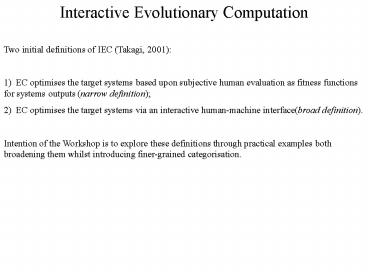Interactive Evolutionary Computation - PowerPoint PPT Presentation
1 / 6
Title:
Interactive Evolutionary Computation
Description:
1) EC optimises the target systems based upon subjective human evaluation as ... Origins of Interactive Evolutionary Computation - Graphic Art, Music and Fashion ... – PowerPoint PPT presentation
Number of Views:43
Avg rating:3.0/5.0
Title: Interactive Evolutionary Computation
1
Interactive Evolutionary Computation Two initial
definitions of IEC (Takagi, 2001) 1) EC
optimises the target systems based upon
subjective human evaluation as fitness functions
for systems outputs (narrow definition) 2) EC
optimises the target systems via an interactive
human-machine interface(broad definition). Intent
ion of the Workshop is to explore these
definitions through practical examples both
broadening them whilst introducing finer-grained
categorisation.
2
- Narrow Definition
- User represents a black box evaluation
function - User operates within a psychological space
rather than a parametric space e.g. evaluates
system output (e.g. sound, graphics etc) rather
than parametric (phenotype) description. - Takes into account fluctuating human
preferences that are generally impossible to
model. - Techniques identify regions of interest
containing a number of preferred solutions (close
in psychological space but possibly diverse in
parametric space?). - Human fatigue (cognitive overload?) factor
restricts number of generations.
3
- Broad Definition
- Tends to relate to Evolutionary Multi-objective
satisfaction where human evaluation of objective
preferences is required along with qualitative
judgement of quantitative solutions. - Also relates to human input into evolutionary
process in terms of introduction of elite
solutions / radical solutions, variation of
constraints, addition / subtraction of variables.
4
- More Detailed Definition?
- Three categories may be more appropriate
- Subjective selection - where interaction relates
to human selection of favorite option along with,
perhaps, a simple ranking of available solutions
- Subjective evaluation - where a more rigorous
human evaluation of available solutions takes
place, possible machine-learning component. - Problem definition - where user interacts with
evolutionary system to gather optimal information
which supports the modification / reformulation
of the evaluation function. Agent-based support
and machine-learning.
5
Workshop Format Presentation 1 Origins of
Interactive Evolutionary Computation - Graphic
Art, Music and Fashion I. C. Parmee Short
Discussion Period Presentation 2 Applications
of Interactive Evolutionary Computation
P. Caleb-Solly Short Discussion
Period Invitation to the floor - short
presentations, extended comments Break for
Coffee
6
Presentation 3 Adaptive Image Segmentation
Based on Visual Interactive Feedback
Learning P. Caleb-Solly Short
Discussion Period Presentation 4
Poor-definition, Uncertainty and Human Factors
- A Case for Interactive Evolutionary Problem
Reformulation? I. C. Parmee Short
Discussion Period Invitation to the
floor Round- table Session































